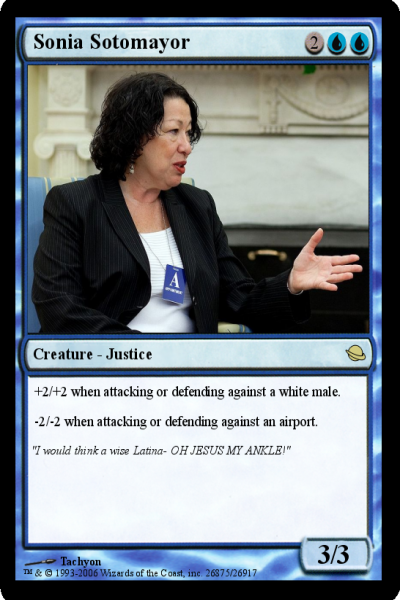I'm not one of these people who gets all worked up about other people's failure to adhere to arcane grammar rules. For example, I have no problem with people misusing the phrase "begs the question" to mean "invites the question," even though it traditionally means something else that I don't fully understand. I also freely admit that I have no idea how to handle the "that/which" dichotomy. But there's one rule of grammar that is flouted incessantly even by my most intelligent friends and colleagues, and it drives me positively bonkers, mainly because it's a relatively simple rule that (or which) is quite easy to follow if you think about it for a few seconds.
Let's start with the basics. Consider this sentence:
"I stabbed Pete."
Here we have two characters -- Pete, who got stabbed, and the speaker, who did the stabbing. The speaker is referring to himself as "I" because he is performing the action in the sentence. Hardly anyone would mistakenly write "Me stabbed Pete" unless that person were a caveman, Frankenstein's monster, a toddler, or a non-native English speaker during the first five minutes of their very first session of their English class. This is an easy rule that no one gets wrong.
Let's see what happens when we add a character.
"John and I stabbed Pete."
Wuh oh, here comes John. John and the speaker both stabbed Pete. It is critical to note that John's arrival has no effect whatsoever on the identity of the speaker. The speaker is still "I", notwithstanding that he is no longer acting alone. The following sentence is, of course, incorrect:
"John and me stabbed Pete."
As is:
"Me and John stabbed Pete."
Any English-speaker with any sort of education knows this to be the case, and even if the rule isn't assiduously followed at all levels of society, it's not a very common error among even the most minimally erudite speakers and writers of English. It's a lesson that grade school teachers relentlessly hammer into the feeble young minds of America's youth, who for some reason often develop the habit of saying "Me and ______" as they develop their rudimentary language skills.
So, to review, the arrival of "John," and his buddy "and," do not change the identity of the speaker. The speaker remains as though John weren't there. (I should also add at this point that I'm much more comfortable using the subjunctive in Spanish than I am in English, so I have no idea if that last sentence was correct.):
"[John and] I stabbed Pete."
Now let's see what happens when Pete turns the tables, first without John:
"Pete stabbed me."
Hey now! The speaker has suddenly changed from "I" to "me"! The simple act of switching roles from the stabber to the stabbee has deprived the speaker of his single-capital-letter identifier and mysteriously transformed him into the much different "me". Again, hardly any body screws this up. You're unlikely to see or hear anyone earnestly say:
"Pete stabbed I."
Okay, we have that down. Now here's where the trouble begins. What happens when Pete exacts his revenge on both the speaker and John? Does adding John in this scenario change the speaker back to "I"?
"Pete stabbed John and I."
No! Wrong! Totally, absolutely, one hundred percent wrong. This is not how the English language works. Rather, John's arrival has the exact same effect on the speaker as it did back when the speaker was doing the stabbing -- NONE AT ALL:
"Pete stabbed John and me."
And here's the tellistrator replay:
"Pete stabbed [John and] me."
This, unfortunately, is a rule that people seem to have a great deal of trouble following. Perhaps it's the fault of those grade school teachers who taught us to fear with utmost revulsion the use of the word "me" when talking about oneself and someone else. But the blunt instruments of grade school are no excuse for failing to follow the simple rules of grammar as adults.
And it is a simple rule. (See what I did there? You're not supposed to start sentences with "And," but I just did. I'm not an unbending grammar nazi, I just have a particular affinity for the I/me regulations. And don't get me started on parentheses.) All you have to do to determine whether you're using "I" or "me" correctly is to rewrite the sentence without including your co-conspirators:
Wrong: "Me and John stabbed Pete."
Right: "John and I stabbed Pete."
Wrong: "Pete stabbed John and I."
Right: "Pete stabbed John and me."
The same holds true if the speaker takes another step away from the action. Observe:
Yes: "Pete threw a brick at John and me."
No: "Pete threw a brick at John and I."
You see? It's very simple.
Now let's move on to some truly advanced material: photo captions. What's wrong with this caption?
"My boyfriend and I in Paris."
Well, let's use our trick and get rid of the boyfriend. Would anyone in their right mind write the following caption?
"I in Paris."
No, of course not. The proper caption is:
"Me in Paris."
And thus, adding the boyfriend back in, we get:
"My boyfriend and me in Paris."
Easiest thing in the world, yeah?
So, please stop misusing the letter I, and limit it to its intended purpose. And don't be afraid of putting "me" next to your friends. It's an easy rule and I'm tired of people screwing it up.
Now go forth and keep the commandment I have given you, or cursed be thy name forever.
Love,
Me




